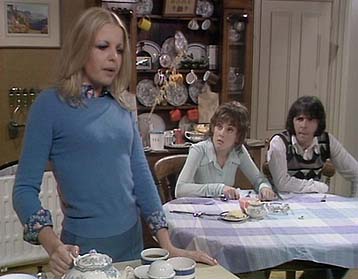 |
| Man about the House |
British sitcoms on TV have been around
since even before American sitcoms: Pinwright's Progress, was aired from
November 1946 till May 1947. This makes it nearly a year older than the first
American televised sitcom. Although there are many similarities between
American and British sitcoms in that they both focus on a family, workplace or
other institution and have largely the same character types, there are distinct
differences as well.
The first major difference is the amount of
episodes per series. Generally British sitcoms air less than 10 episodes per
series or season, whereas in America it is usual for seasons to consist of
around 20 episodes. Also many British sitcoms are produced for the BBC, which
has no commercial breaks during broadcasts and limited commercials in between
programmes. This allows for a full 30 minute run time for sitcoms, whereas
American sitcoms generally run for 22 minutes, to accommodate 8 minutes of
commercials.
Another key difference is the number of
writers. US-made sitcoms are often written by a team of a dozen resident
writers, sometimes even more, whereas British sitcoms are generally written by
2 or 3 writers, who are often also the creators and (executive) producers of
the show. This results in a different type of show with often a more consistent
storyline.
 |
| Peter Capaldi in The Thick of It - a modern British sitcom |
British comedies often follow a topical
storyline which incorporates cultural developments and recent real-world
events. Often the sitcom comments on these happenings. A well-known 1970s
sitcom is Man about the House, which shows, and comments on, the changing role
of women in society. During the 1980s the young generation started revolting
and demanding a more equal role in society. This was portrayed by sitcoms,
which started the 'alternative comedy' genre. The best example of this is
possibly The Young Ones which follows a group of 4 students who share a home
and each take the place of the classic sitcom characters: Neil is the mother,
Vyvyan and Rick are the teenage children and Mike is the distant father.
With many British sitcoms gaining huge
popularity abroad and some being remade for American TV, they are among the
most successful types of comedy around. And much like American sitcoms they are
here to stay.
"Why isn't my life like a situation comedy?
Why don't I have a bunch of friends with nothing better to do but drop by and
instigate wacky adventures? Why aren't my conversations peppered with
spontaneous witticisms? Why don't my friends demonstrate heartfelt concern for
my well being when I have problems? ...I gotta get my life some writers." - Bill Waterson (Author Calvin and Hobbes)

Geen opmerkingen:
Een reactie posten
Leave a message!